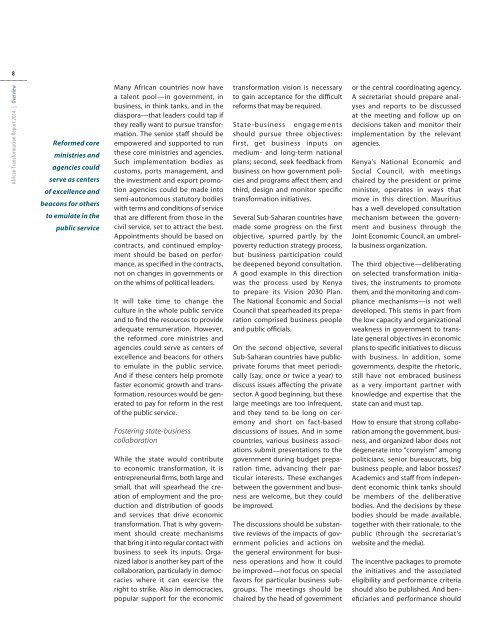2014-african-transformation-report
2014-african-transformation-report
2014-african-transformation-report
You also want an ePaper? Increase the reach of your titles
YUMPU automatically turns print PDFs into web optimized ePapers that Google loves.
8African Transformation Report <strong>2014</strong> | OverviewReformed coreministries andagencies couldserve as centersof excellence andbeacons for othersto emulate in thepublic serviceMany African countries now havea talent pool—in government, inbusiness, in think tanks, and in thediaspora—that leaders could tap ifthey really want to pursue <strong>transformation</strong>.The senior staff should beempowered and supported to runthese core ministries and agencies.Such implementation bodies ascustoms, ports management, andthe investment and export promotionagencies could be made intosemi-autonomous statutory bodieswith terms and conditions of servicethat are different from those in thecivil service, set to attract the best.Appointments should be based oncontracts, and continued employmentshould be based on performance,as specified in the contracts,not on changes in governments oron the whims of political leaders.It will take time to change theculture in the whole public serviceand to find the resources to provideadequate remuneration. However,the reformed core ministries andagencies could serve as centers ofexcellence and beacons for othersto emulate in the public service.And if these centers help promotefaster economic growth and <strong>transformation</strong>,resources would be generatedto pay for reform in the restof the public service.Fostering state-businesscollaborationWhile the state would contributeto economic <strong>transformation</strong>, it isentrepreneurial firms, both large andsmall, that will spearhead the creationof employment and the productionand distribution of goodsand services that drive economic<strong>transformation</strong>. That is why governmentshould create mechanismsthat bring it into regular contact withbusiness to seek its inputs. Organizedlabor is another key part of thecollaboration, particularly in democracieswhere it can exercise theright to strike. Also in democracies,popular support for the economic<strong>transformation</strong> vision is necessaryto gain acceptance for the difficultreforms that may be required.State-business engagementsshould pursue three objectives:first, get business inputs onmedium- and long-term nationalplans; second, seek feedback frombusiness on how government policiesand programs affect them; andthird, design and monitor specific<strong>transformation</strong> initiatives.Several Sub- Saharan countries havemade some progress on the firstobjective, spurred partly by thepoverty reduction strategy process,but business participation couldbe deepened beyond consultation.A good example in this directionwas the process used by Kenyato prepare its Vision 2030 Plan.The National Economic and SocialCouncil that spearheaded its preparationcomprised business peopleand public officials.On the second objective, severalSub- Saharan countries have publicprivateforums that meet periodically(say, once or twice a year) todiscuss issues affecting the privatesector. A good beginning, but theselarge meetings are too infrequent,and they tend to be long on ceremonyand short on fact-baseddiscussions of issues. And in somecountries, various business associationssubmit presentations to thegovernment during budget preparationtime, advancing their particularinterests. These exchangesbetween the government and businessare welcome, but they couldbe improved.The discussions should be substantivereviews of the impacts of governmentpolicies and actions onthe general environment for businessoperations and how it couldbe improved—not focus on specialfavors for particular business subgroups.The meetings should bechaired by the head of governmentor the central coordinating agency.A secretariat should prepare analysesand <strong>report</strong>s to be discussedat the meeting and follow up ondecisions taken and monitor theirimplementation by the relevantagencies.Kenya’s National Economic andSocial Council, with meetingschaired by the president or primeminister, operates in ways thatmove in this direction. Mauritiushas a well developed consultationmechanism between the governmentand business through theJoint Economic Council, an umbrellabusiness organization.The third objective—deliberatingon selected <strong>transformation</strong> initiatives,the instruments to promotethem, and the monitoring and compliancemechanisms—is not welldeveloped. This stems in part fromthe low capacity and organizationalweakness in government to translategeneral objectives in economicplans to specific initiatives to discusswith business. In addition, somegovernments, despite the rhetoric,still have not embraced businessas a very important partner withknowledge and expertise that thestate can and must tap.How to ensure that strong collaborationamong the government, business,and organized labor does notdegenerate into “cronyism” amongpoliticians, senior bureaucrats, bigbusiness people, and labor bosses?Academics and staff from independenteconomic think tanks shouldbe members of the deliberativebodies. And the decisions by thesebodies should be made available,together with their rationale, to thepublic (through the secretariat’swebsite and the media).The incentive packages to promotethe initiatives and the associatedeligibility and performance criteriashould also be published. And beneficiariesand performance should


